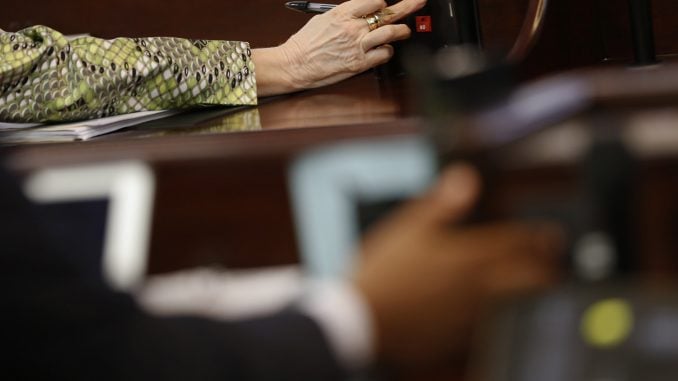
RALEIGH After only two weeks of closed door negotiations, Republican lawmakers introduced their state budget compromise on Monday and promptly passed it in the state Senate Tuesday. The $22.9 billion biennium budget appears to include significant personal and corporate tax cuts, incremental pay raises for teachers, and a large deposit into the state rainy day fund.”I want to thank all those who worked really exceptionally hard, I think we have a really good relationship we spent a lot of time together, know each other a little bit better, and we’re happy with the results,” House budget chair Nelson Dollar (R-Wake) said, followed by laughs from his colleagues, during a press conference Monday evening.The quick compromise is a departure from the conference processes of years past. In 2015, for example, Senate and House leaders signed three continuing resolutions, drawing negotiations out for more than four months before adjourning in late September.The full budget was posted around 11:30 p.m. Monday night. The Senate passed the bill Tuesday evening, and the House should vote on it in the coming days. One week ahead of the fiscal year deadline, the Republican-led legislature is ready to face a new governor that doesn’t share their enthusiasm for conservative budgeting.”Last time I stood before you, I told you the General Assembly’s budget and Gov. [Roy] Cooper’s budget contain many of the same funding priorities the same is true today,” said Senate Leader Phil Berger (R-Rockingham). “In fact, I understand that he sent an email to his supporters over the weekend calling for a budget that spends more in education this one does; more in health care this one does; funds economic development this one does; and funds public safety this one does.”Berger and House Speaker Tim Moore (R-Cleveland) were said to have briefed the governor Monday night on their budget proposal in a private meeting at the Executive Mansion.By Tuesday morning, Cooper blasted Republicans in a press conference. He stopped short of saying he would veto the proposal but called it the “most fiscally irresponsible budget” he’d ever seen.”This budget chooses tax breaks for the wealthy and corporation an short changes education and economic development,” said Cooper. “It does pick winners and losers. The wealthy win but the average middle class family loses.”With or without the governor’s approval, lawmakers are seeking to make significant strides to reduce the taxpayer burden, offering around $530 million in both personal and business tax cuts this budget cycle. However, the vast majority of the changes will not go into effective until the end of the decade.Effective Jan. 1, 2019, the personal income tax will drop from 5.499 to 5.25 percent.On the same timeline, lawmakers will increase the standard deduction allowing North Carolinians to write off more of their earned income. Married filing jointly taxpayers and surviving spouses will see a jump from $17,500 to $20,000, heads of household from $14,000 to $15,000, and single and married filing separately taxpayers from $8,750 to $10,000.Another change will come in the form of child care relief, as lawmakers have moved from a tax credit to a deduction. Parents making up to $120,000 a year will be able to include child care expenses as part of their tax-free income, with the highest potential at $2,500 for families earning $40,000 a year.With the average household income in N.C. hovering around $47,800 a year, this would mean most families will be able to deduct close to half their taxable income once these changes go into effect.Piggybacking on the economic success of the last few years, Republicans continue to move toward imposing zero taxes on corporations that set up shop in the state.Also effective Jan. 1, 2019, the corporate income tax will be reduced from 3.0 to 2.5 percent.The budget also simplifies and reduces the franchise tax by cutting what is effectively a statewide property tax on small businesses and creating a flat $200 tax on the first $1 million of a business’s net worth.Also, $4 million in additional funding will go toward tourism, domestic and international advertising to promote economic development in North Carolina. Another $4 million will go toward bolstering revitalization grants to help towns and cities across the state restore property attractive to businesses.The only tax changes that will occur in 2018 involve business-to-business transactions, including repealing the mill machinery purchasing tax and offering a sales tax exemption to businesses looking to set up large warehouses in the state.”In the 21st century, fulfillment centers are a key component to economic development, and create hundreds of jobs,” House Finance Committee Co-chair Rep. John Szoka (R-Cumberland) said in a statement. “Increasing our competitive advantage in the region with a lower corporate tax rate will play a significant role in the years to come.”The proposed teacher pay scale appears to closely resemble the House version, awarding almost all intermediate through veteran career levels increases of some size. Teachers with 17 to 24 years of experience will see the biggest bump; however, starting teachers who have received the most attention from the legislature in the past couple of years will not see a pay increase at all.On average, teachers will see a 9.2 percent pay raise over the next two years, while principals can expect an average 8.6 percent increase and assistant principals a 13.4 percent increase.Lawmakers will also bolster state reserves with a $363 million deposit into the state rainy day fund, bringing the grand total to $1.838 billion accounting for an unprecedented 8.2 percent of the total state budget. An additional $125 million will be set aside to manage vital repairs and renovations to state-owned and university buildings.The budget also includes Raise the Age legislation, paving the way for 16- and 17-year-olds to be tried as juveniles by Dec. 1, 2019. As a result, lawmakers included in the budget funding for more assistant district attorneys and $13.5 million toward new youth detention center.The 2017 plan is a 3 percent increase over the base budget.



